For modern Web pages, scripts are obviously a crucial element. Their weight is growing in terms of importance and the amount of bytes. For instance, think of single page applications and the amount of code they need to give us all the features and animations required, without having to hit the Reload button on our browser. The total size of scripts in a page is far from the one of video and audio files, but it’s getting closer to the size of images. In this article, I’ll test the performance of two of the most visited websites, Facebook and Twitter, highlighting some of their major issues. Then, I’ll focus on how to improve the loading time of the scripts of a page by introducing you to a library called basket.js.
Measuring the Performance of Facebook and Twitter
Before covering what basket.js is and what problem it solves, let’s start with a real-world example. Let’s use a tool like the Chrome Developer Tools or F12 Developer Tools to measure the number of bytes transferred and the loading time of the Facebook wall. To perform this task in a reliable way, you have to hard reload the page in your browser and empty the cache, of course. If you need more instructions, this tweet by Addy Osmani will help you. Said that, what’s the total size of scripts loaded for the average Facebook wall (ballpark) and what’s the ratio images/scripts? And regarding the challenge of CSS versus JavaScript, which one is going to be heavier? Take a guess and write your answers down but… don’t cheat! Let’s take a look at the results: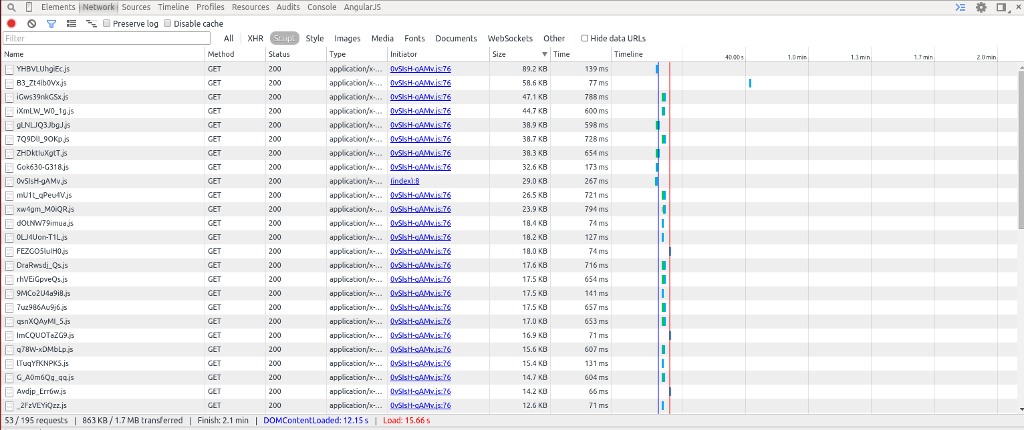
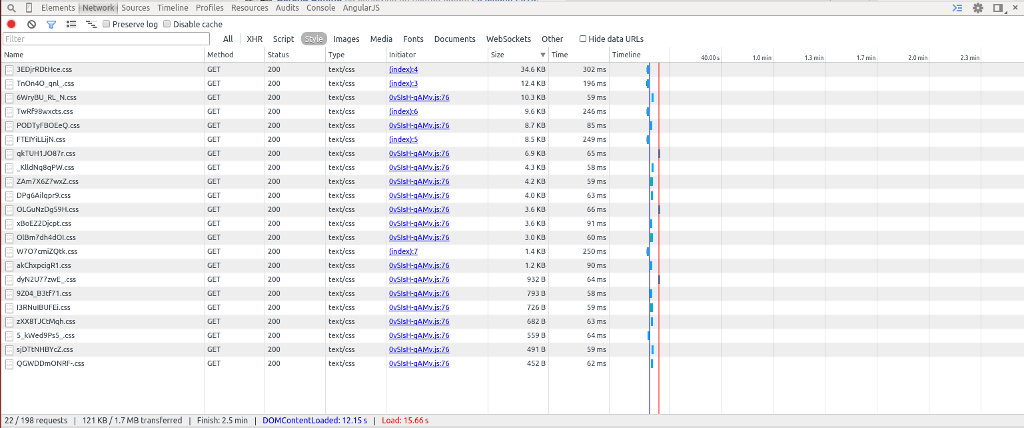
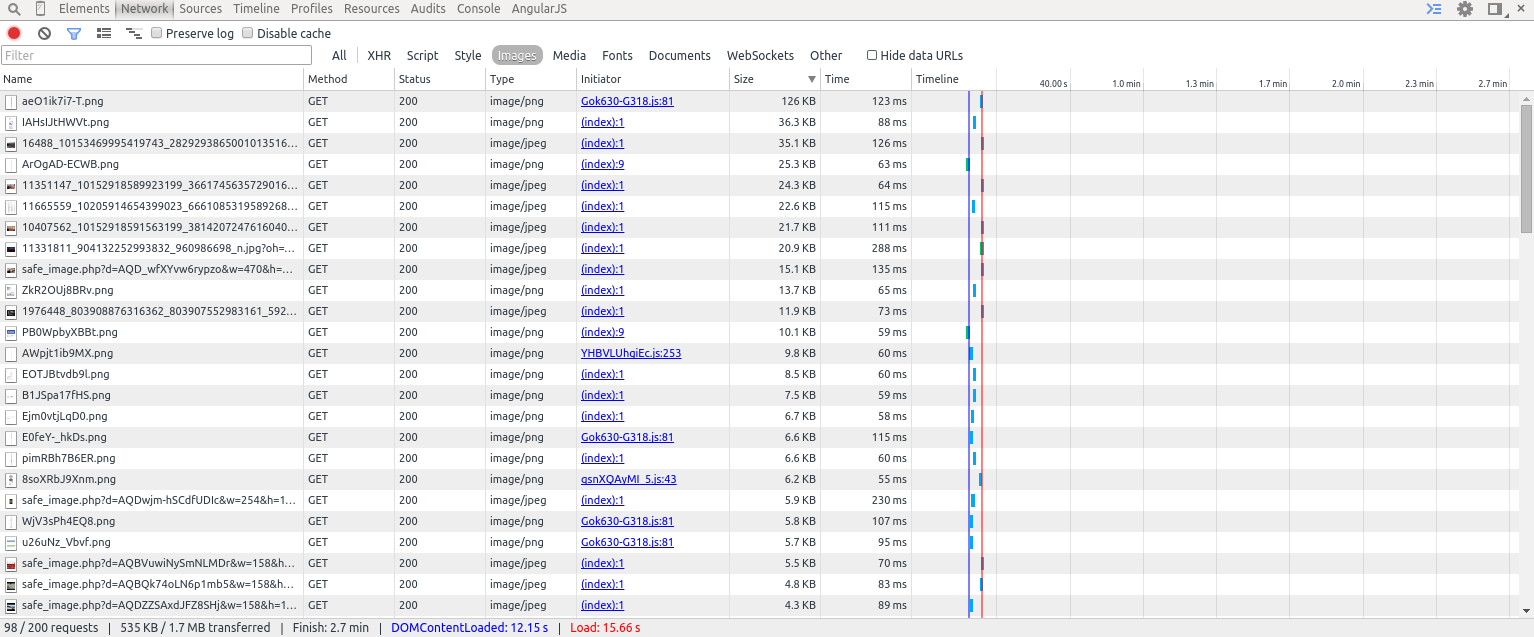 And here you can find a summary of them:
And here you can find a summary of them:
- Scripts: Total size: 785 KB, Number of requests: 49, Total sum of loading time: ~9s
- CSS: Total size: 125 KB, Number of requests: 18, Total sum of loading time: ~2.2s
- Images: Total size: 251 KB, Number of requests: 68, Total sum of loading time: ~8s
- Scripts: Total size: 417 KB, Number of requests: 4, Total sum of loading time: ~650ms
- CSS: Total size: 114 KB, Number of requests: 3, Total sum of loading time: ~200ms
- Images: Total size: 647 KB, Number of requests: 36, Total sum of loading time: ~3.5s
What’s Basket.js
As stated on its website,basket.js is a small JavaScript library supporting localStorage caching of scripts.This quote summaries very well the aim of this project. Once the library is loaded into the memory, then it sends asynchronously requests to retrieve the other scripts needed by the page. It injects them into the document and then caches them into the browser’s local storage. Doing so, the next time the page is loaded, the scripts will be loaded locally without performing any HTTP request. Recalling the Facebook examples above, it means that you’ll save 49 HTTP requests, almost 800 KB, and a total (summed) loading time of ~9 seconds (on a broadband connection! You can reasonably expect this to be much slower on a 56K one).
LocalStorage vs Browser Cache vs Indexed DB
As mentioned before, research brought on by Google and Microsoft concur thatlocalStorage is much faster than browser cache. On SitePoint we have covered this topic recently with the article HTML5 Local Storage Revisited, where Luis Vieira also covered some of the limitation of localStorage. In addition IndexedDB is (surprisingly) slower than localStorage, both for reading and writing.
Obtaining exact measurements is quite challenging, and at the moment no extensive research is available – although it is one of the priorities for the project.
How to Use basket.js
Using the library is really simple. It provides four main methods:basket.require(): require remote scripts and inject them into the page (with or without caching them)basket.get(): inspectlocalStoragefor scriptsbasket.remove(): remove a cached scriptbasket.clear(): remove all cached scripts
Require Scripts
To require a script, we can write a statement like the following:basket.require({ url: 'jquery.js' });- it becomes easy to handle dependencies using a promise chain to set the loading order
- it is possible to handle when scripts can’t be loaded, and hence fail gracefully
- as a plus, you can cache a file without executing it on load – you’ll be able to retrieve it with
.get()at a later point, if you actually need it
- an alias to reference it
- if the script has to be execute once loaded
- the amount of hours after which the script will expire or…
- …if it has to skip cache altogether.
Handling Dependencies
In case none of your scripts has dependencies, you can simply require them all at once:basket.require(
{ url: 'jquery.js' },
{ url: 'underscore.js' },
{ url: 'backbone.js' }
);basket.js‘ promise-oriented API makes your life easy:
basket
.require({ url: 'jquery.js' })
.then(function () {
basket.require({ url: 'jquery-ui.js' });
});Fine Grain Script Cache Expiry Management
As mentioned above, scripts can be kept out of cache individually, or expiry time can be set for each of them separately.basket.require(
// Expires in 2 hours
{ url: 'jquery.js', expire: 2 },
// Expires in 3 days
{ url: 'underscore.js', expire: 72 },
// It's not cached at all
{ url: 'backbone.js', skipCache: true },
// If you later change this value the older version from cache will be ignored
{ url: 'd3.js', unique: 'v1.1.0' }
);Manually Clearing the Cache
You can remove a single item from the cache:basket
.remove('jquery.js')
.remove('modernizr');remove basket.clear(true);remove basket.clear();Manually validate items in cache
You can even provide your own custom function to validate items in cache and decide when to mark them as stale. You can overwritebasket.isValidateItem with a function that returns true when the cached item is valid, and false when the script has to be loaded from source again.
This does not overwrite existing check for the expiry and unique options, but adds on top of it. Moreover, even if overwriting isValidateItem is a powerful option, it’s unlikely you will really need it, ever.
Hands-on: Let’s build an Example
I usedbasket.js to refactor scripts loading for TubeHound, replacing RequireJS as a script manager.
This is what the main script header looked like before:
requirejs.config({
"baseUrl”: "js/",
"paths": {
"jquery": "./lib/jquery-2.0.3.min",
"Ractive": "./lib/Ractive",
"utility": "utility",
"fly": "./lib/Ractive-transitions-fly",
"fade": "./lib/Ractive-transitions-fade",
"bootstrap": "./lib/bootstrap.min",
"jquery-ui": "./lib/jquery-ui-1.10.4.custom.min",
"jquery-contextmenu": "./lib/jquery.contextmenu"
},
"shim": {
"jquery": {
exports: 'jquery'
},
"Ractive": {
exports: 'Ractive'
},
"utility": {
deps: ['jquery'],
exports: 'utility'
},
"bootstrap": {
deps: ['jquery'],
exports: 'bootstrap'
},
"jquery-ui": {
deps: ['jquery'],
exports: 'jquery-ui'
},
"jquery-contextmenu": {
deps: ['jquery'],
exports: 'jquery-contextmenu'
}
}
});
require([
'jquery',
'Ractive',
'utility',
'bootstrap',
'fly',
'jquery-ui',
'jquery-contextmenu',
'fade'
], function ($, Ractive, utility) {
...
});loading.js:
(function () {
function requireScriptsDependingOnJQueryAndRactive () {
return basket.require(
{ url: 'js/lib/bootstrap.min.js'},
{ url: 'js/lib/Ractive-transitions-fly.js', key: 'fly' },
{ url: 'js/lib/Ractive-transitions-fade.js', key: 'fade' },
{ url: 'js/lib/jquery-ui-1.10.4.custom.min.js', key: 'jquery-ui' },
{ url: 'js/lib/jquery.contextmenu.js', key: 'jquery-contextmenu' },
{ url: 'js/utility.min.js', key: 'utility', unique: 1 }
);
}
basket.require(
{ url: 'js/lib/jquery-2.0.3.min.js', key: 'jquery' },
{ url: 'js/lib/Ractive.js', key: 'Ractive' }
).then(requireScriptsDependingOnJQueryAndRactive)
.then(function () {
basket.require({ url: 'js/thound.min.js', unique: 1 }); //unique is to make sure we can force a reload, in case of bugs
});
}());<script> tag in the HTML page (right after basket.js):
<script src="js/lib/basket.min.js"></script>
<script src="js/loader.js"></script>utility.js. Before, there was some plumbing needed by RequireJS:
requirejs.config({
"baseUrl": "js/",
"paths": {
"jquery": "./lib/jquery-2.0.3.min"
},
"shim": {
"jquery": {
exports: 'jquery'
}
}
});
define([
'jquery'
], function ($) {
"use strict";
...
});var utility = (function () {
"use strict";
...
}());Performance
Let’s get to the grain: how much of an improvement did I get? Here it is the baseline, a hard reload of the existing page: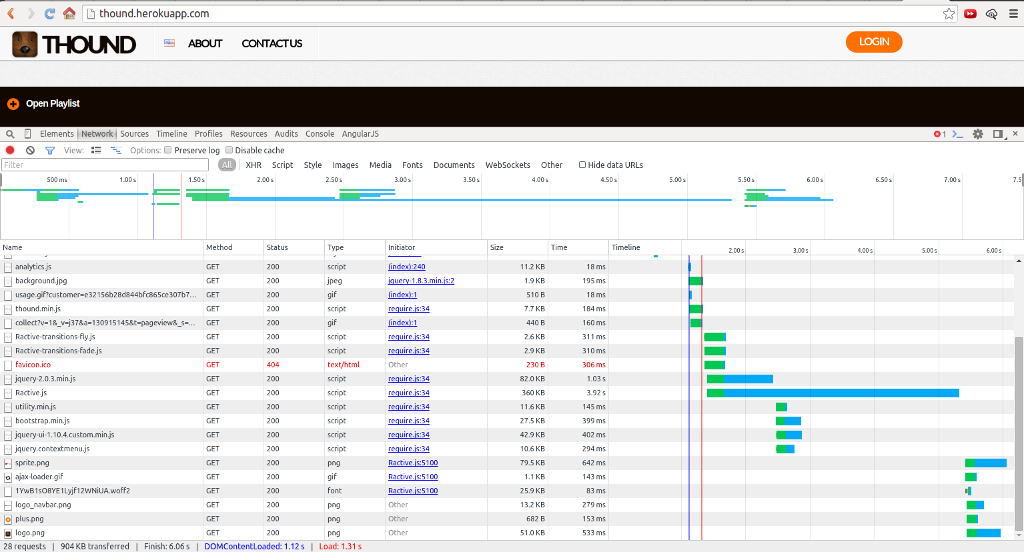 It took 6.06s to download 904KB with 28 requests. Next, I hard-reloaded the new version of the page, and measured again:
It took 6.06s to download 904KB with 28 requests. Next, I hard-reloaded the new version of the page, and measured again:
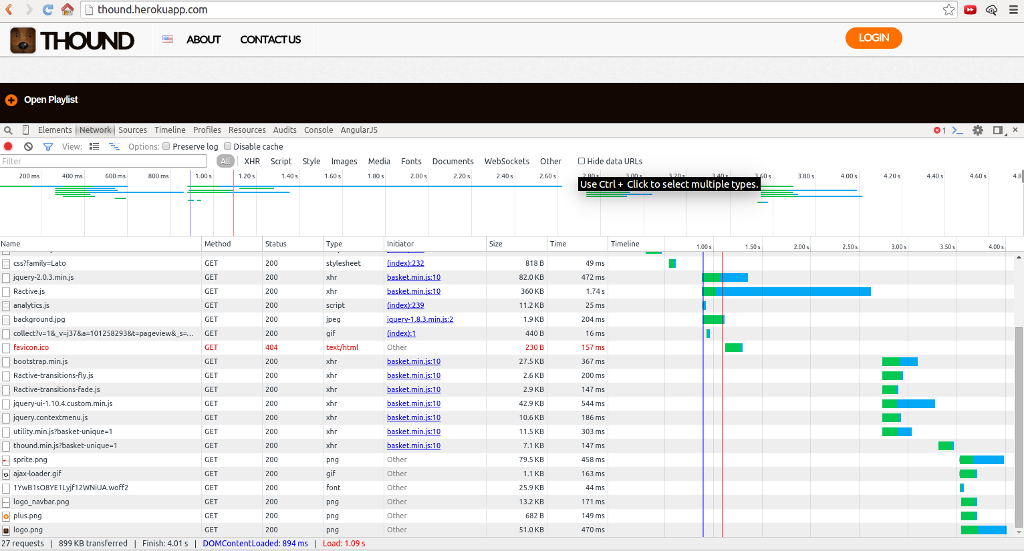 Since it’s loading the page from scratch, all the scripts are loaded via HTTP requests. It took 4.01s to download 899KB with 27 requests (requireJS was left out and replace by basket.js).
At this point, when you hard-reload the page again, everything is flushed from browser’s cache but scripts are kept in
Since it’s loading the page from scratch, all the scripts are loaded via HTTP requests. It took 4.01s to download 899KB with 27 requests (requireJS was left out and replace by basket.js).
At this point, when you hard-reload the page again, everything is flushed from browser’s cache but scripts are kept in localStorage: the delta will measure the actual gain provided by caching scripts.
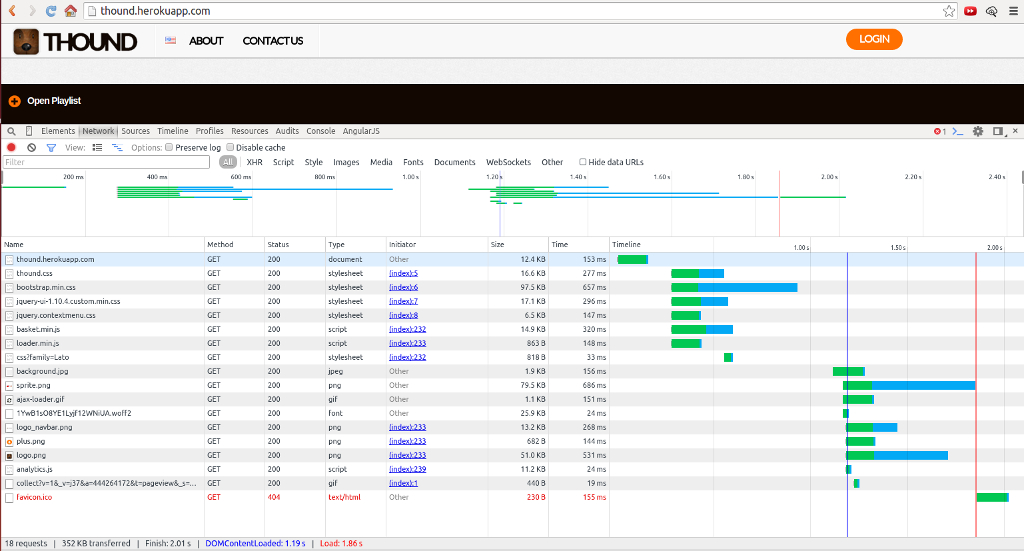 The result is: 2.01s to download the 352KB needed with 18 requests. So for a page that is JS-intensive you actually have a pretty good saving.
Finally, let’s see the final loading time for a normal access to the homepage:
The result is: 2.01s to download the 352KB needed with 18 requests. So for a page that is JS-intensive you actually have a pretty good saving.
Finally, let’s see the final loading time for a normal access to the homepage:
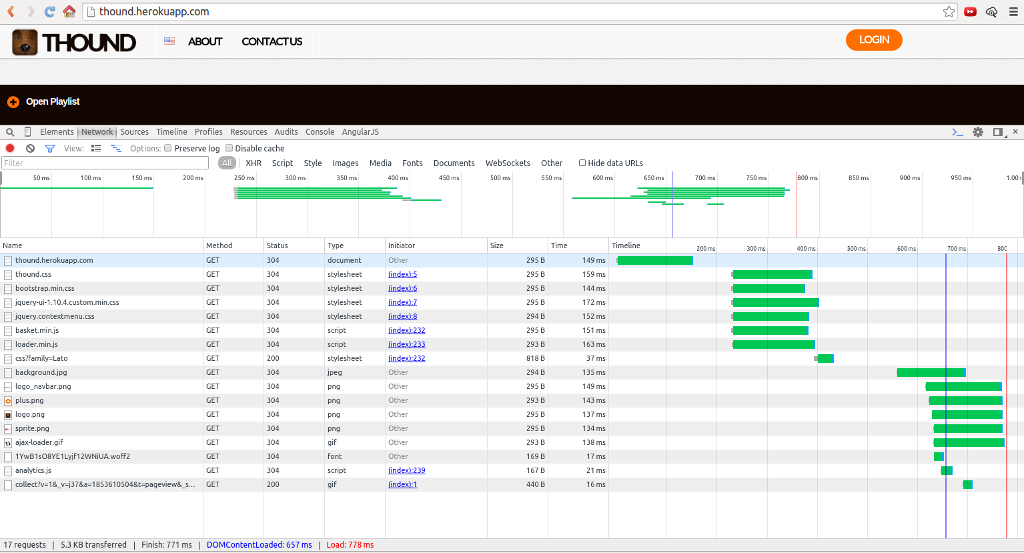 Using browser cache and
Using browser cache and basket.js, the page can be loaded in 771ms, and only 5.3KB are actually loaded (17 requests, mostly served from cache).
Conclusions
This library is a good idea, with the one flaw of relying on a less than perfect data API. The considerations that led to choosinglocalStorage are totally understandable. It’s trying to improve performance, and experience has shown that localStorage is the fastest solution available.
On the other hand, as Donald Knuth loves to say, “premature optimization is the root of all evil”! Without extensive and rigorous performance comparisons it’s hard to weight the limitations caused by quota restrictions. Unfortunately issues with localStorage are not going away any time soon, at least not for Chrome, where augmenting the quota would require some non-trivial rewriting.
The good news is that basket.js‘ authors are considering several alternatives, including a tiered solution that will try to use the best persistence API available on the browser: Service Workers, Cache API (on Chrome), or FileSystem API.
I was a bit surprised to see that Service Workers were not initially considered, but apparently this is going to change soon. And, even better news, there are a number of emerging libraries working on similar ideas from different angles. Shed, for instance, looks promising: an even broader range solution that make Service Workers super easy to use.
A few problems I could touch first-hand (and get burned by) when trying to use it on a real project:
- Feedback can be largely improved: it is hard to tell what’s going on when it fails to load your scripts. If you are lucky, you might see some kind of errors, but the messages is far from meaningful. For example, I was passing an actual array to the
require()method: all I got was a genericTypeErrorfrom the lib’s code, so it took me a lot of trials and errors to realize my mistake. - Now if you are not lucky: a script might not be loaded at all because you have a typo (f.i.
basker.require) inside a callback along the promises chain. Since your error message gets swallowed, it will take you some time to realize it. - In case you have dependencies for your scripts, you lose the clear declarative syntax you have using RequireJS, where you can list dependencies for each of them.
- On the other hand, you have all of your dependencies listed and ordered in a single place. And, let’s face it, RequireJS is a little verbose and redundant.
- Once they are cached, the scripts loaded asynchronously won’t show up in the Network panel of Chrome development tools (nor Firefox’s). Moreover, you won’t see them listed in the sources even when they are loaded from the remote source. This makes debugging a bit harder, but can be worked around during development, if you use
basket.jsonly in production, when optimization is needed.
basket.js is a very promising idea, and the results looks really good – but my take is it needs a little extra step to be ready to be used for the development of a complex project – or in production for a huge page. (This would be true for any project that has not reached version 1, due to possible changes in its interface/structure).
For a small-to-medium project, instead, this could be a nice way to cut your users’ loading time and frustration. I for one will keep an eye on it, and I’ll be happy to champion its adoption, as soon as the project reaches maturity.
Frequently Asked Questions about Improving Loading Time with Basket.js
What is Basket.js and how does it improve loading time?
Basket.js is a script loader that leverages the localStorage feature of HTML5 to cache scripts. It improves loading time by storing scripts in the user’s browser, reducing the need for repeated downloads. This means that when a user revisits your website, the scripts don’t need to be downloaded again, resulting in faster loading times.
How does Basket.js compare to other script loaders?
Unlike other script loaders, Basket.js uses localStorage, which allows for larger storage capacity and faster access times compared to cookies. It also has a built-in freshness mechanism, which ensures that the scripts stored in localStorage are always up-to-date.
How do I implement Basket.js in my website?
To implement Basket.js, you need to include the Basket.js script in your HTML file. Then, you can use the basket.require() function to load your scripts. You can also set an expiry time for each script, after which the script will be re-downloaded.
Can Basket.js handle dependencies between scripts?
Yes, Basket.js can handle dependencies between scripts. You can use the basket.require() function to specify the order in which scripts should be loaded. This ensures that dependent scripts are loaded in the correct order.
What happens if the user’s browser doesn’t support localStorage?
If the user’s browser doesn’t support localStorage, Basket.js will fall back to normal script loading. This means that the scripts will be downloaded every time the user visits your website, but it ensures that your website will still function correctly.
How can I check if a script is already in localStorage?
You can use the basket.get() function to check if a script is already in localStorage. This function returns a promise that resolves with the script if it’s in localStorage, or rejects if it’s not.
Can I use Basket.js with other JavaScript libraries?
Yes, you can use Basket.js with other JavaScript libraries. You just need to make sure that the other libraries are loaded before Basket.js, to ensure that they are available when Basket.js runs.
How can I clear the scripts stored in localStorage by Basket.js?
You can use the basket.clear() function to clear all scripts stored in localStorage by Basket.js. You can also use the basket.remove() function to remove a specific script.
What are the limitations of using Basket.js?
One limitation of using Basket.js is that it relies on localStorage, which has a limited storage capacity. If the storage limit is reached, Basket.js will not be able to store any more scripts. Also, not all browsers support localStorage, so Basket.js may not work on all browsers.
Can I use Basket.js for loading CSS files?
Yes, you can use Basket.js for loading CSS files. You just need to specify the type of the file as ‘css’ in the basket.require() function. This will ensure that the CSS file is loaded correctly.
 Marcello La Rocca
Marcello La RoccaI'm a full stack engineer with a passion for Algorithms and Machine Learning, and a soft spot for Python and JavaScript. I love coding as much as learning, and I enjoy trying new languages and patterns.

